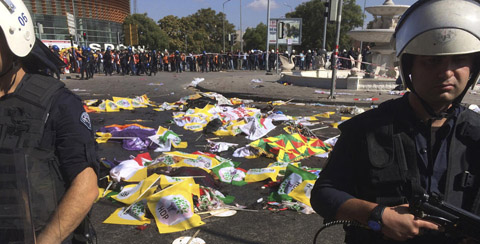Was Erdogan Behind Ankara Bomb?
Was Erdogan Behind Ankara Bomb? –
BY MICHAEL RUBIN
Commentary Magazine
The Ankara bombing of a peace rally organized by Kurds, labor unions, and civil society groups was the worst single act of terrorism in Turkish history. Among both Turks and those outside Turkey, it has shaken confidence in Turkey and its stability. No terrorists have issued a claim of responsibility.
Within Turkey, the government suggested either the Kurdistan Workers Party (PKK) or the Islamic State (ISIS, ISIL, Daesh) might be behind the bombing. The PKK and its offshoots have certainly engaged in terrorism in the past, but in recent years the PKK has transformed itself into much more of a traditional insurgency: It targets Turkish forces that target it, but it does not bomb Kurds marching to call upon the Turkish government to stop bombing the PKK.
Turkish government officials and many analysts at Washington-based institutions which cultivate close relations with Turkey’s ruling party point the finger at the Islamic State. On one level, this makes some sense: The only group which has effectively fought the Islamic State inside Syria (and around Sinjar in northern Iraq) are the Syrian Kurdish peshmerga, the YPG, which are closely affiliated with the PKK and might even be infused with Turkish PKK members. The Islamic State could theoretically wish to target the Kurds in their rear, where they feel most comfortable.
In the aftermath of the attack, I talked to friends and contacts that ranged the gambit from unapologetic Kemalists to apolitical Turkish businessmen to unabashed PKK supporters, and there was a remarkable consensus that Erdoğan and his handpicked allies in the Turkish intelligence service should be at the top of the list of suspects. Even though conspiracies might strike Westerners and journalists unaccustomed to Turkey as somewhat unhinged or unrealistic, there are a number of reasons why there might be fire behind the smoke in this instance:
- Erdoğan has been fanning the flames of crisis ahead of the November 1 polls. He wants to suppress the Kurdish vote and, if not directly responsible for violence, he has signaled to his often militant followers that the Kurds are fair game. If the predominantly Kurdish Peoples’ Democratic Party (HDP) again surpasses the 10 percent voter threshold as it did in June, they will dash Erdoğan’s hope of winning enough of a majority for his Justice and Development Party (AKP) in parliament enabling him to impose a new constitution empowering his presidency.
- The security services have conducted terrorism against Kurds before. In January 2013, three PKK leaders were executed in their office in Paris. French security services intercepted telephone communications between Ankara and the assassin, whose links to Turkish security has been established beyond a reasonable doubt. By any objective measure, Turkey’s role in the Paris assassinations should have forced its listing as a state sponsor of terror.
- The Islamic State would think twice before striking inside Turkey, given Turkey’s hands-off approach toward it. Despite the much-ballyhooed promise to launch airstrikes against the Islamic State, the Turkish Air Force has been bombing the Kurds fighting the Islamic State almost exclusively.
- Even if the Islamic State planted the bomb, the close working relationship between the group and Turkey’s intelligence agency should raise questions whether the Islamic State was acting without the knowledge of some within Erdoğan’s inner circle. Indeed, earlier this summer, Turkish websites published photographs of Turkish intelligence officials providing weaponry, explosives, and other military material to the Islamic State at a border crossing between Turkey and Syria. This comes after the Erdoğan regime imprisoned Turkish soldiers who intercepted an arms shipment between Turkey and the Nusra Front, an al-Qaeda affiliate inside Syria.
- Lastly, Erdoğan’s sorry record of fabricating evidence and using the judiciary and security services to target political adversaries in the guise of Ergenekon and Bayroz investigations, and more recently perhaps in his targeting of Fethullah Gülen’s Hizmet movement should raise serious questions about the ability of Erdoğan to investigate the bombings in Ankara honestly. Simply put, few in Turkey beyond Erdoğan’s partisans are going to trust the current Turkish government to investigate the bombings, and no one outside Turkey should do so.
Conspiracies should never be embraced blindly, nor should conclusions be drawn absent evidence. But when it comes to Turkey, all possibilities must be considered. The only credible investigation is going to be an independent investigation, Erdoğan’s complaints about insulting sovereignty be damned. If he has nothing to hide, he should welcome assistance to investigate the worst terrorist atrocity on Turkish soil; and in the center of its capital no less. The evidence should be public, and if it points back to Erdoğan’s inner circle, then no one – whether in a metal shanty or in the presidential palace — should be immune from the consequences of their action.

